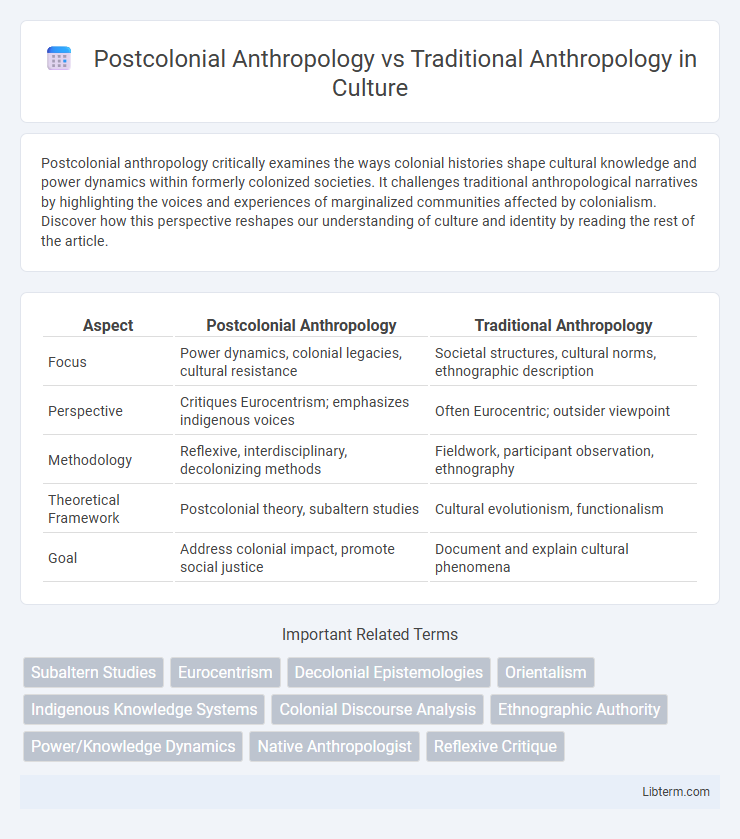Postcolonial anthropology critically examines the ways colonial histories shape cultural knowledge and power dynamics within formerly colonized societies. It challenges traditional anthropological narratives by highlighting the voices and experiences of marginalized communities affected by colonialism. Discover how this perspective reshapes our understanding of culture and identity by reading the rest of the article.
Table of Comparison
| Aspect | Postcolonial Anthropology | Traditional Anthropology |
|---|---|---|
| Focus | Power dynamics, colonial legacies, cultural resistance | Societal structures, cultural norms, ethnographic description |
| Perspective | Critiques Eurocentrism; emphasizes indigenous voices | Often Eurocentric; outsider viewpoint |
| Methodology | Reflexive, interdisciplinary, decolonizing methods | Fieldwork, participant observation, ethnography |
| Theoretical Framework | Postcolonial theory, subaltern studies | Cultural evolutionism, functionalism |
| Goal | Address colonial impact, promote social justice | Document and explain cultural phenomena |
Introduction to Anthropology: Traditional vs Postcolonial Perspectives
Traditional anthropology emphasizes studying cultures through objective observation and classification, often rooted in Eurocentric frameworks that prioritize Western norms. Postcolonial anthropology critiques these colonial biases by highlighting power dynamics, cultural hybridity, and indigenous epistemologies previously marginalized or misrepresented. Understanding these perspectives is essential in anthropology as it reshapes methodologies, promotes ethical research, and validates diverse cultural narratives.
Historical Development of Traditional Anthropology
Traditional anthropology emerged in the 19th century, rooted in colonial and imperial contexts where European scholars studied non-Western societies through ethnographic fieldwork and cultural evolution theories. It primarily focused on categorizing human societies, often reinforcing Eurocentric perspectives and hierarchical classifications of cultures. Postcolonial anthropology critiques these foundations by highlighting power imbalances, emphasizing indigenous voices, and deconstructing colonial legacies embedded in traditional methodologies.
Emergence and Foundations of Postcolonial Anthropology
Postcolonial anthropology emerged as a critical response to traditional anthropology's Eurocentric biases and colonial frameworks, focusing on decolonizing knowledge production and representing marginalized voices. It is grounded in the works of scholars like Edward Said, Gayatri Spivak, and Homi Bhabha, who emphasized the impact of colonial power dynamics on culture and identity. Traditional anthropology often prioritized cultural objectivity and ethnographic detachment, whereas postcolonial anthropology foregrounds historical context and power relations in its analysis.
Key Theoretical Differences between the Two Approaches
Postcolonial anthropology critiques traditional anthropology's Eurocentric focus and power dynamics by emphasizing the importance of indigenous voices, colonial histories, and the persistent impacts of imperialism on cultural representations. It challenges the objective neutrality claimed by traditional anthropology, highlighting how knowledge production often reinforces colonial power structures and advocating for reflexivity and ethical engagement with studied communities. Key theoretical differences include postcolonial anthropology's commitment to decolonizing methodologies and addressing issues of identity, resistance, and hybridity, contrasting with traditional anthropology's tendency toward universalist, normative frameworks.
Representation of Colonized Peoples: Shifts in Narrative
Postcolonial anthropology critiques traditional anthropology's portrayal of colonized peoples as passive subjects, emphasizing instead their agency and voices in shaping history. This shift in narrative challenges Eurocentric perspectives by highlighting indigenous knowledge systems and cultural resilience. Representation now prioritizes self-representation and collaborative methodologies to decolonize anthropological research.
Methodological Contrasts: Objectivity vs Reflexivity
Postcolonial anthropology challenges traditional anthropology's claim to objectivity by emphasizing reflexivity, recognizing the researcher's positionality and the influence of power dynamics in knowledge production. Unlike traditional anthropology, which often aimed for detached observation, postcolonial approaches prioritize dialogue, co-creation of narratives, and critical examination of colonial legacies embedded in methodologies. This shift fosters ethical research practices that acknowledge subjectivity and strive to decolonize anthropological frameworks.
Critiques of Bias and Power Dynamics in Traditional Anthropology
Postcolonial anthropology critiques traditional anthropology for perpetuating colonial power dynamics and Eurocentric biases that marginalize indigenous voices and knowledge systems. It highlights how traditional anthropological methods often reinforce unequal power relations by interpreting cultures through a Western lens, leading to misrepresentation and exoticization. This approach calls for decolonizing methodologies that prioritize collaborative research, reflexivity, and the empowerment of postcolonial subjects to challenge historical biases and promote more equitable knowledge production.
Contributions of Postcolonial Thinkers and Scholars
Postcolonial anthropology challenges traditional anthropology by critiquing Eurocentric perspectives and emphasizing the effects of colonialism on knowledge production, identity, and power dynamics. Influential postcolonial scholars like Edward Said, Gayatri Spivak, and Homi K. Bhabha contribute concepts such as Orientalism, subaltern studies, and hybridity, reshaping how cultures and histories are represented and understood. Their work promotes reflexivity, decolonization of methodologies, and recognition of marginalized voices, significantly enriching anthropological research and theory.
Case Studies Illustrating Both Approaches
Postcolonial anthropology critically examines case studies such as the analysis of indigenous resistance in settler colonies, highlighting power imbalances and cultural hybridity that traditional anthropology often overlooks by focusing on descriptive ethnographies from a Eurocentric perspective. Traditional anthropology case studies, like Bronislaw Malinowski's work in the Trobriand Islands, emphasize participant observation and detailed cultural documentation without interrogating colonial contexts. Comparative studies reveal that postcolonial anthropology incorporates reflexivity and critiques of historical power dynamics, reshaping interpretations in contrast to traditional anthropology's more neutral or objective stance.
Future Directions in Anthropological Research and Discourse
Future directions in anthropological research emphasize decolonizing methodologies, amplifying indigenous voices, and prioritizing collaborative knowledge production, marking a shift from traditional anthropology's often Eurocentric frameworks. Postcolonial anthropology advocates for critical examination of power dynamics and historical contexts, fostering more ethically grounded and socially relevant studies. Integrating interdisciplinary approaches and digital technologies further broadens the scope, enabling nuanced understandings of globalization's impact on diverse cultures.
Postcolonial Anthropology Infographic

 libterm.com
libterm.com